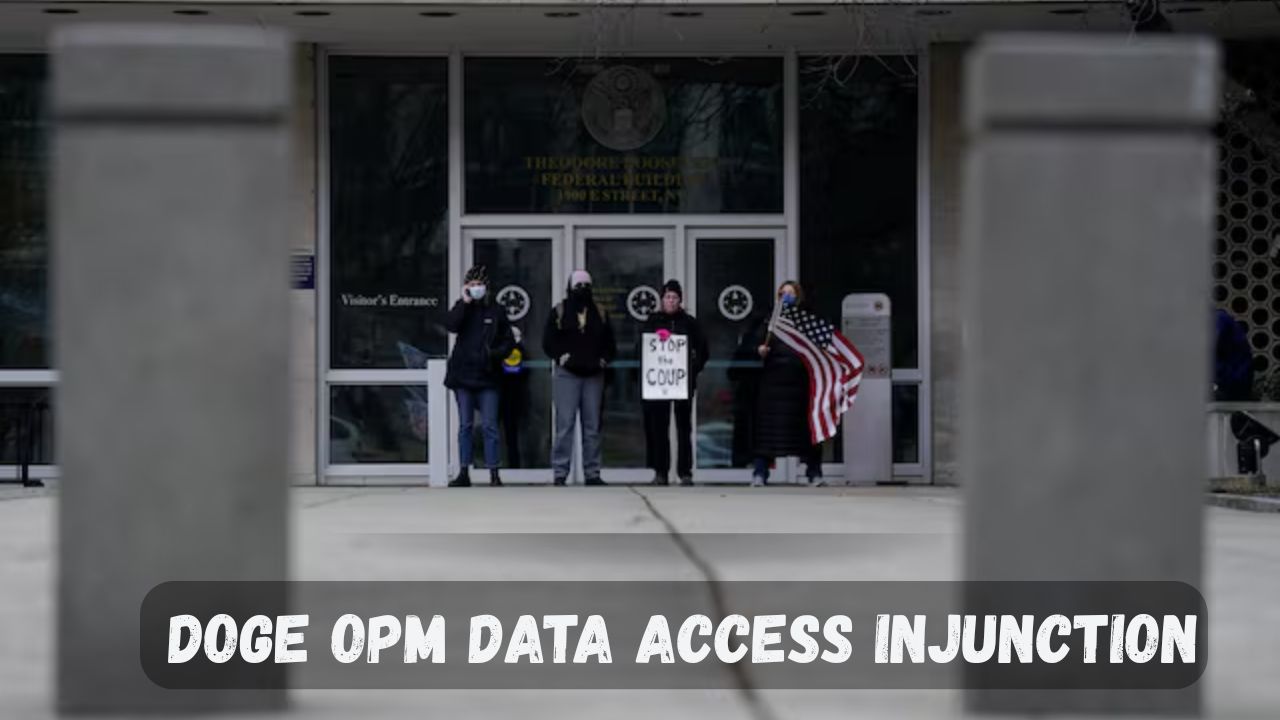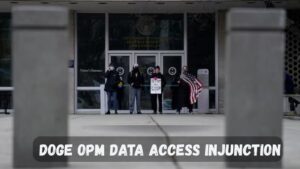The Department of Government Efficiency (DOGE) is a new federal office created to make government systems faster and cheaper. But it quickly became controversial when it tried to get access to personal records from the Office of Personnel Management (OPM), the agency that stores sensitive data about millions of federal workers.
A judge stepped in and put an injunction to stop that access, saying it might break privacy laws (AP News). Later, an appeals court allowed DOGE to continue under certain rules, which sparked even more debate (Reuters).
Some whistleblowers even warned that this move could put the data of over 300 million Americans at risk (Washington Post). In this article, we’ll go through what DOGE is, why the injunction was issued, who was involved, how the courts responded, and what it all means for privacy and security in the future.
| Category | Facts & Figures |
|---|---|
| DOGE Formation | Created through Executive Order in Jan 2025 to modernize IT throughout the government and provide centralized data access.)(Wikipedia) |
| Size of OPM Data | OPM has records on 2.1 million federal employees alongside retirees and contractors. (FEDweek) |
| Whistleblowers’ Revelations | Charles Borges claims 300+ million Americans’ records were uploaded to non-secured cloud storage.)(Washington Post, AP) |
| Types of Data Involved | Social Security numbers, addresses, income data, health data — all highly sensitive. (MarketWatch, AP) |
| Court Proceedings | Judge Denise Cote issued a preliminary injunction against DOGE’s access. (Federal News Network) |
| Permanent Ban (Later Reversed) | A broader injunction stopped DOGE from gaining access to information at OPM, Education, and Treasury. (FEDweek) |
| Appeals Court Reversal | Fourth Circuit declared DOGE access legal pursuant to intra-agency data sharing rules.)(Reuters, JURIST) |
| Privacy Concern | Labour unions and civic organisations claim future damages will be “inevitable” without added protections. (AP, EFF) |
| Possible Threat | It could lead to global mass identity theft at a cost of billions annually. (MarketWatch) |
| Reform Initiatives | Politicians aim to bring the 1974 Privacy Act up to date to incorporate coverage on cloud technology and surveillance using AI. (Wikipedia, WPost) |
Background & Context
What is DOGE?
The Department of Government Efficiency (DOGE) was created in January 2025 by an executive order. Its job was to make government computer systems work faster and cost less.
Supporters said it would modernize IT and cut waste. Critics, however, worried that it had too much power and too little oversight. You can read more about its creation on Wikipedia.
Role of the Office of Personnel Management (OPM)
The Office of Personnel Management (OPM) is the main agency that stores information on federal employees. This includes things like pay, retirement benefits, job history, and even security clearance records. It is one of the largest collections of government workforce data in the U.S.
That is why DOGE’s request to access OPM files raised alarms. Reports from FEDweek and The Register explain how OPM became the center of this legal fight.
Why this matters
The data inside OPM is very sensitive. It covers millions of current and former federal employees, including their addresses, Social Security numbers, and background check details.
If used wrongly, this kind of information could lead to identity theft or political misuse. That’s why watchdogs and unions stepped in.
As FEDweek noted, and AP News confirmed, the case quickly grew into a major privacy battle.
Legal Challenges & Court Orders
Initial Lawsuits & Injunctions
Soon after DOGE started requesting access, federal unions and privacy groups filed lawsuits. They argued that OPM was breaking the Privacy Act and the Administrative Procedure Act (APA) by handing over data without proper vetting.
These legal challenges are documented on Wikipedia, statements from AFGE, and coverage in AP News.
Preliminary Injunction
In June 2025, Judge Denise Cote ruled that OPM had broken the law. She issued a preliminary injunction that blocked DOGE from accessing OPM data until the case was reviewed further.
The ruling was a big win for privacy advocates. You can see more on Federal News Network and the Electronic Frontier Foundation (EFF).
Access Report Demand
The court also wanted clarity on what was really happening. It ordered OPM to submit a full report on what access DOGE already had, how it was approved, and who authorized it. This demand was reported by Federal News Network.
Permanent Injunction
Later that month, another federal judge issued a permanent injunction. This ruling was broader. It not only blocked DOGE from accessing OPM records but also extended to data held by the Departments of Education and Treasury. According to FEDweek, this was meant to stop the spread of unchecked data sharing.
Appeals & Legal Reversals
Appeals Court Decision
The fight didn’t end there. In August 2025, the Fourth Circuit Court of Appeals overturned the earlier injunction. The court said DOGE could continue accessing OPM records under intra-agency data sharing rules, which normally let federal offices share information internally. Reports from Government Executive, JURIST, and Reuters show how the ruling reshaped the case.
Ongoing Legal Debate
Even after the appeals decision, the debate kept growing. Privacy advocates argued that harm was inevitable if DOGE kept handling such large volumes of personal data. On the other hand, defenders of DOGE said the program was legal, and no actual misuse had been proven yet. This clash of views is captured well by JURIST and Reuters.
Data Security Whistleblower Revelations
Charles Borges’ Complaint & Resignation
In August 2025, a new twist shook the whole case. Charles Borges, the chief of Social Security data, resigned suddenly. He said DOGE had uploaded sensitive records of more than 300 million Americans into cloud systems that were not properly secured.
This included nearly every Social Security record in the country. His claims were first reported by The Washington Post, and confirmed in AP News and Politico.
His resignation fueled fears that the risk wasn’t theoretical anymore — it was already happening.
Potential Risks
The whistleblower’s warning was clear: the exposed information included Social Security numbers, home addresses, income details, and even medical records.
With that much data floating in unsecured places, the risk of mass identity theft skyrockets. A report from MarketWatch described how this could impact almost every American, while AP News highlighted the huge privacy stakes. For many, this was no longer about legal debate — it was about real danger.
Bigger Implications
Privacy & Civil Liberties
The fight over DOGE and OPM access is not only about law and agencies. It’s also about how much privacy Americans should expect from their own government.
The controversy showed how quickly vast amounts of personal data could be shifted around without clear checks. As The Washington Post noted, and Wikipedia explained, the debate exposed big gaps in transparency and accountability.
Power Dynamics & Oversight
Legal experts warned that DOGE was a test case for executive power. If one office could pull in sensitive records without full review, what would stop others from doing the same?
The concern was about institutional balance — keeping power in check. Articles from The Washington Post and Business Insider showed how courts, Congress, and watchdogs were scrambling to react.
Legislative and Reform Efforts
In response, many lawmakers began calling for updates to the Privacy Act, which was written decades ago, long before cloud computing and big data systems existed. They argued the law must catch up with modern technology and protect citizens from large-scale surveillance risks. As Wikipedia notes, Congress is already looking at reforms that could change how federal agencies share and store personal information.
Conclusion:Doge OPM Data Access Injunction
In the end, the DOGE–OPM fight shows just how fragile the balance is between innovation and protection. On one side, the government wants to modernize systems and speed up data use.
On the other, there’s the clear danger of misuse, leaks, and even identity theft, as the whistleblower case made painfully real. Courts stepped in, unions and privacy groups raised alarms, and Congress started talking about reforms.
The outcome so far is mixed DOGE still has some access under legal rules, but the trust gap is wide. The reasoning is simple: if sensitive data can be moved without strong safeguards, then citizens carry all the risk. That’s why this case matters beyond agencies and lawsuits.
It’s a reminder that modernization must come with accountability, or the cost to privacy will be too high.








